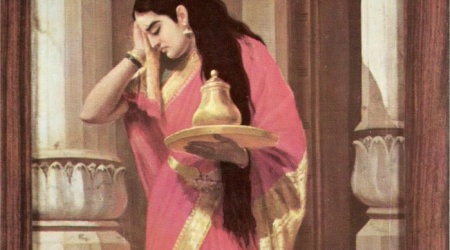What is education as awakening? It means extraordinary sensitivity—the ability to recognize and understand one’s hidden tears, concealed anxieties and deepest longings.
Irwati Karve was a gifted anthropologist. Her reflections on Draupadi’s last journey make us understand love and pain, death and redemption.

After the death of the Yadavas—especially of Krishna—the Pandavas could no longer remain on earth. They settled their affairs and set out on the last pilgrimage. Draupadi, of course, was with them. They crossed the Ganges, then the Himalayas, and finally reached a treeless plateau. Here and there were a few rocks scattered about. Otherwise it was completely barren. Month after month the six walked in single file. Then one day Draupadi suddenly fell down. …She fell, and five, ten feet in front of her, the others fell. Dharma alone went forward with his dog.
‘Look, won’t you—she’s fallen!’ Bhima said. ‘Why did she fall?’
“Bhima, keep going. She fell because she loved Arjuna the most,’ Dharma answered without looking back.
Draupadi fell down. Nakula, Sahadeva, Arjuna and, last of all, Bhima fell one after the other. Dharma alone went ahead with his dog.
True, Draupadi had fallen, but she had not toppled over dead. A terrible fatigue had overwhelmed her. She could not take a single step more. Lying there, she heard Bhima’s question and Dharma’s answer. This was the Great Journey in which no one waited for anyone else. Putting her hand on her head , she lay waiting for death. But she was conscious. Dharma’s words stirred memories, and in her last moments scene after scene came before her eyes. She recognized the hurt in Dharma’s words, the contempt too.
For the first time in her life she pitied the king from her heart. …Draupadi understood Dharma’s frustration, and for a moment she felt regret. But only for a moment. Realizing his contempt, she was startled, but that too only for a moment. She smiled to herself, and remembered the day of swayamvara. After Arjuna had won her she had married all five of them, one after the other. Didn’t the king realize a little of the pain she had experienced then? She had had to kill her own mind. At least in her actions she had treated all five alike. Perhaps the mind could not be killed completely. …If she had loved Arjuna most, was there anything astonishing about that?
Her mind stopped a moment. What does it mean to have loved? Ulupi, Chitrangada, Subhadra—Arjuna had loved so many women. Or had he? Had Arjuna given his heart to any woman? Women had loved him, but he had given his heart to Krishna. She knew how from the beginning, from the settling of Indraprastha, Arjuna and Krishna would sit talking by the hour. In their talk, there was always some new idea—perhaps about building a city; but they talked as friends, each one speaking from his heart and listening to the other. No woman could win Arjuna’s heart. Is love always like that? Is it always one-sided? I pine for someone who doesn’t return my love, someone else yearns for me. Suddenly, as if shocked, she stopped. The realization pierced like lightning; there was one who had given his whole life for her. She sighed with her new understanding. …
Draupadi heard a dragging sound, then a great sigh. Her whole body quivered with fear. She had been waiting quietly for the moment of her death. Was a wild animal coming? A hyena? In all the days of walking on the plateau they had seen no animals. Better that it fastened on her throat at once, without mauling her. She closed her eyes hard. As she lay waiting for the unnamed danger to strike, suddenly a shadow fell over her eyes. A curtain had dropped between her and the sun. A low deep voice called, ‘Draupadi’. It was Bhima’s voice. It was he who had dragged himself, grasping with effort, over the ten, fifteen feet that separated them. On the way he had seen Arjuna, Nakula and Sahadeva lying dead, and had thought Draupadi must be dead too. When Draupadi, frightened at his approach, had quivered, he had caught with joy this sign of life. ‘What can I do for you?’ The words came out with difficulty. It was the same question he had asked all his life, but in this situation it was utterly meaningless and incongruous. . Draupadi smiled. Bringing Bhima’s face close to hers, she said with her last breath, ‘ In our next birth be the eldest, Bhima; under your shelter we can live in safety and joy.’
—- Irwati Karve, Yuganta: The End of an Epoch













